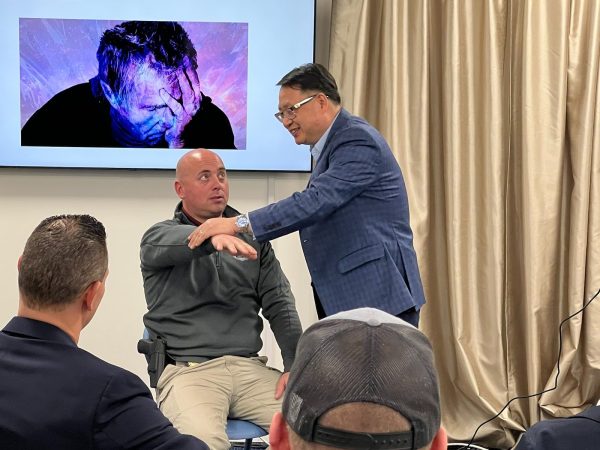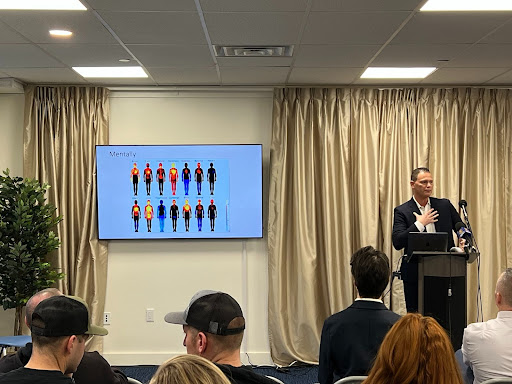On Feb. 20, Middletown New York’s Northern Medical Center officially launched a new Wellness Program with a pilot study geared towards local police officers and their family members.
The 12-week program is intended to connect participants to their five dimensions of health – physical, metabolic, energetic, mental, and spiritual health. Participants will learn how to optimize their own health and wellbeing, and the goal of the program is to empower “them to make choices leading to long-lasting happiness,” a press release on the matter reads.
“The pilot study is the first step of the program, and the invaluable data collected will be projected to a larger campaign with the goal of making this program beneficial and accessible to all Middletown residents,” it adds.
“We are thrilled to offer this innovative program to the residents of Middletown,” said Dr. Jingduan Yang, lead physician of the Middletown Wellness pilot program. “We believe that everyone deserves access to quality healthcare that focuses on their overall health and wellbeing, and this program is designed to do just that,” he added.
The event featured presentations by an array of local medical professionals including Dr. Robert Backer, a psychologist who delivered a presentation entitled, “The Mind & the Body.”
The mind and body
Success
You are now signed up for our newsletter
Success
Check your email to complete sign up
During a half hour presentation, Backer spoke about the relationship between the mind and body, and enlisted two volunteers to join him on stage where he hooked them up to a device that allowed the audience to view their brain activity as he walked them through a series of mental exercises.
“The way that you think affects the way that you feel which affects the way you act,” Backer told the audience.
Backer, who has worked with numerous elite athletes and martial artists, said that they train in such a repetitive way that no matter the stress they may be under in the moment they react based on habit, not emotionally. “Because when you’re under stress, when you are feeling strong emotions …. You are not the most critical thinker in that moment,” Backer explained, adding that, “The way we react to situations has a lot to do with how we control our internal state and how we teach our bodies to react.”
He further explained that “over time … thoughts become repetitive behaviors and those behaviors become habits,” adding that if this is not addressed in a proactive way it could lead to “long-term health conditions.”
“There is a major connection between chronic health conditions and mental issues,” he said, adding that diseases such as COPD, diabetes and even obesity are “intimately related to our mental functioning.”
Ultimately, he wanted the audience to understand that with mental training comes focus and abilities that one may not know they have.
“We age more healthily, we’re able to have a better memory, less distraction and also eliminate pain because your body starts to produce the things that you are actually expecting,” he explained.
“We have more abilities than we even realize, and part of the way to access that is through training the brain, training the mind,” he said.
READ MORE:
- Northern Medical Center Embarks on New Integrative Medicine Program With Local Police Department in Upsate
- SY Aesthetics: Where Traditional Healing Meets Modern Western Medicine
- Emotional and Spiritual Health Takes Center Stage at International Cosmetic Medicine Symposium in Middletown

Your bodies energy
Dr. Jingduan Yang, CEO of Northern Medical Center, was in attendance and conducted a presentation where he spoke about some of the more intangible things associated with healthy living including the energy in one’s body.
Dr. Yang is a board-certified psychiatrist and an expert in classic forms of Chinese medicine. He received his medical and neurology training at the Fourth Military Medical University in Xian, China before completing a research fellowship in clinical psychopharmacology at Oxford University in the UK and then completed his residency training in psychiatry at Thomas Jefferson University in Philadelphia.
“Our body exists in four dimensions,” Yang explained, adding that, “the body, the structure you can see it, and the chemistry you can measure it. But energy, think about energy. Do you see the energy? Do you see the air? Can you see the air here in the room? No. Does air exist, is air important? Yes. The same thing in our body, it’s full of energy. Without energy we are not alive,” he explained.
However, he added, “Modern medicine doesn’t understand how energy works, they can’t see it. It’s not like the nervous system, you can see it, or arteries.”
He went on to say that people will see specialists for different problems, problems that are all directly linked to the energy in the body, including problems with the hearts, lungs, kidneys, liver etc.
Yang says what can sometimes be the cause of the problems is stress. He explained that stress is an “emotional reaction to what’s happening,” and further explained that anger can impact the performance of one’s liver.
“If this anger, if what caused you the anger or resentment is something that happens repetitively, particularly from a young age up, you’re going to have tremendous trouble with those health issues,” he explained.
“Emotion is a very powerful energy. So, therefore emotional stress is the most powerful energetic impact, or attack, on your body,” he said.
He explained that there are simple techniques to determine one’s stress levels and what negative emotions one is currently carrying and conducted an experiment on willing participants from the audience to demonstrate how to block the negative emotions.
“Confusion affects the heart, anger affects the liver and fear affects the kidney,” he explained.
He said there are many ways one can take care of their energy through proper sleep, a healthy diet, exercise, meditation, chi gong, and acupuncture.
READ MORE:
- Breeze Through Awkward Moments With Emotional Intelligence
- Shen Yun Debuts in the Dominican Republic, Delighting Audiences in Sold-Out Performances
- Shen Yun’s 2023 Performance Wows Audiences in Washington DC, Recognized by Senior Officials
Policing and exercise
In conversation with Zenon Dolnyckyj, “Middletown Wellness Pilot Program” health and fitness coach, he said that taking care of one’s mind and body is paramount for police officers to conduct their jobs safely.
“Physical fitness is paramount for the job that they have because they need to be really healthy and they need to be able to deal with emergencies and they need to be able to deal with them very quickly,” he told Vision Times.
“Unlike other athletes [police] are people that have to be very strong with their regular life, they have no time to warm up, so when their body needs it, it’s at a drop of a hat,” he explained.
“They have to be maintaining a very good physical state and health so that they’re ready when the emergency happens,” he added.
In terms of the physical side of things that are integrated into the program Dolnyckyj said that officers in the field want to exercise with the goal of building bone density which helps with the development of bone marrow which produces blood.
“Having healthier blood is going to help you have better nutrients flowing throughout your body. More oxygen going to your body and it’s going to make your body perform at a higher level,” he explained, adding that, “More oxygen going to your brain means your concentration, your focus, your reaction time is going to be operating at a higher level, when you are doing physical training.”
He went on to explain that when one is engaging in physical training to only improve one’s muscles, they are experiencing a side effect of better brain function but that laypeople and first responders need to train differently.
“When you train, knowing that it’s a matter of life or death, the program design that you would do for a police officer, or any first responder, is going to be very different [than] for a lay person or an athlete,” he explained, adding that, “So, it really comes down to how do you design the exercise program to benefit our first responders.”







